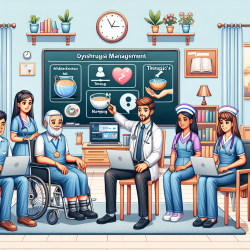In the realm of special education, the management of dysphagia—difficulty in swallowing—presents a significant challenge. A recent study titled Management of Dysphagia in Nursing Homes: A National Survey provides valuable insights that can be translated into practical strategies for schools.
Key Findings and Implications for Schools
The study revealed substantial discrepancies in dysphagia management across nursing homes in Norway. The findings highlight the importance of structured screening, assessment, and intervention protocols. Here's how these insights can be applied in educational settings:
1. Routine Screening and Assessment
Approximately 75% of nursing homes did not routinely screen or assess residents for swallowing problems. In schools, establishing routine screening and assessment for dysphagia can ensure early identification and intervention. This can be done through:
- Regular mealtime observations
- Self-reported complaints from students
- Implementing standardized screening tools
2. Training and Upskilling Staff
The study found a significant need for training and upskilling staff in nursing homes. Similarly, schools should prioritize continuous professional development for staff, including:
- Workshops and webinars on dysphagia management
- Onsite training and supervision by experienced colleagues
- Access to online courses and external expert consultations
3. Implementing Evidence-Based Interventions
Nursing homes often used bolus modification as a standard practice. However, evidence suggests that individualized interventions based on thorough assessments are more effective. Schools can adopt evidence-based strategies such as:
- Adjusting food and liquid consistencies based on individual needs
- Ensuring proper seating and head positioning during meals
- Maintaining oral hygiene to prevent complications
4. Leveraging External Expertise
Nearly 50% of nursing homes lacked access to external experts like speech therapists. Schools should establish connections with external professionals to provide specialized support. This can include:
- Collaborations with speech therapists
- Consultations with nutritionists and occupational therapists
- Utilizing online therapy services like TinyEYE for remote support
Conclusion
The findings from the national survey of nursing homes underscore the critical need for structured dysphagia management protocols, continuous staff training, and access to external expertise. By adopting these practices, schools can significantly enhance the quality of care for students with dysphagia.
To read the original research paper, please follow this link: Management of Dysphagia in Nursing Homes: A National Survey.










